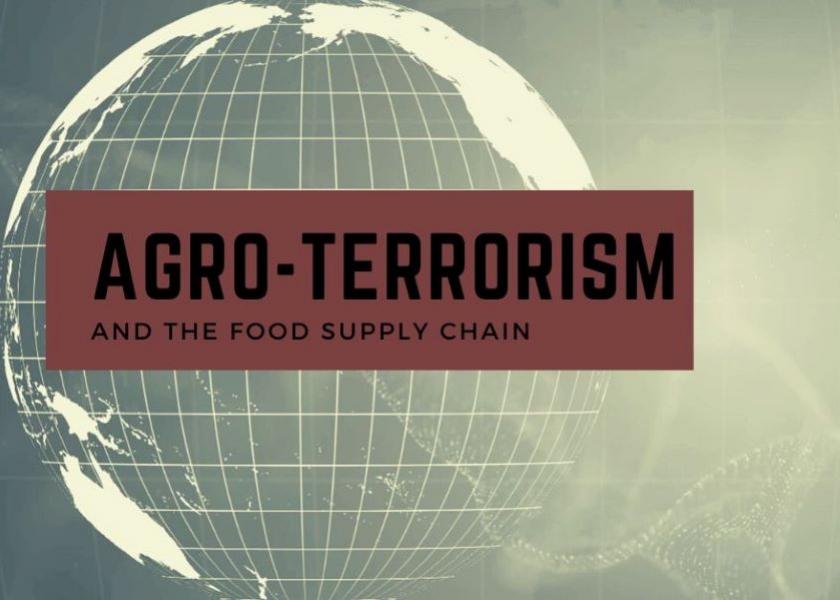Agro-Terrorism and the Food Supply Chain: This is a Different World, Rose Says

If you want to disrupt a government, disrupt the food supply.
“Agriculture is critical infrastructure,” Andrew Rose, strategic advisor to the food and agriculture supply chain, said during Farm Journal’s Farm Country Update on Sept. 28. “Three weeks without food and agriculture, and it’s over. You don’t mess with food and ag.”
Years ago, Rose was working at a large agricultural lender and decided to run a tabletop exercise as part of a teambuilding workshop simulating a ransomware attack on the company.
“Walking away from that exercise, I began thinking, is this a blind spot in the food and agriculture supply chain? Are we aware of the threats out there and the implications they can have? Not only to us as producers and processors, but to the entire critical infrastructure, and our ability to feed our population? I kept getting more questions than I got answers,” Rose said.
Since then, Rose has dedicated himself to helping the agricultural community get more prepared and understand the threats knocking at the gate.
What is Agro-Terrorism?
Agro-terrorism, or the deliberate introduction of a disease agent against livestock or into the food chain, is typically a tactic that can be used to either generate or cause mass socio-economic disruption or as a form of direct human aggression. Rose says there are a lot of definitions out there, but from his research, for a terrorist act to occur, there needs to be violence.
He said the FBI constantly hammers home the concept of sympathy versus action. Rose points out that having strong feelings about something isn’t wrong – acting on it is.
“There's a First Amendment right to say and feel what you want to about any given subject. You can walk outside and put posters up, you can get a bullhorn, cowbells, whatever you want. As soon as you take an action, though, that's when things change. That's when risk and consequence come into the equation,” Rose said.
For the agriculture community in particular, it hurts when someone stands outside of your property and waves a sign, says bad things or shows a picture of things that aren’t true, he said. But until these people take action – until they steal some pigs or commit an act of violence – it’s their right to do that.
“It's a hard pill to swallow, but it's something that if you go to the FBI, they'll say sympathy versus action,” Rose said. “Don't take that action.”
How Can You Protect Yourself and Your Farm?
1. Pay attention to the threat actors.
Know who the threat actors are, including transnational terrorist groups, domestic terrorists, corporate espionage and activists. Engage with organizations like the Animal Agriculture Alliance and Protect the Harvest to keep up to date on threats and movements. Subscribe to their newsletters and learn from their experts.
2. Guard yourself on social media.
“Not only is social media a real threat, it's an ongoing threat,” Rose said.
When he’s speaking to agricultural audiences, the first thing he tells them to do is go to Facebook, click on their privacy settings, and find out which apps and websites they are connected to with their account. Some apps can trick you into clicking “OK” allowing them to sell your information to third parties.
“There are computer programs scraping every bit of social engineering that's publicly available on every human being and compiling it so they have those demographical profiles, whether it's specific to you as an individual, or you as a class of individuals for certain types of messaging,” Rose said.
3. Beware of passive insider threats.
Passive insider threats are people who resist change and fall victim to social engineering. Sometimes, they're told to do certain phishing exercises, or complete multi-factor authentication for their accounts, and they ignore it.
“They use their work devices to go to personal websites or places they probably shouldn't go and they click on things they shouldn't click on. Every employee of every company or organization is part of its cybersecurity defense,” Rose said. “If they're not paying attention, if they're not actively aware of the opportunity that threat actors are looking for, and they're just letting them in, that's a big insider threat.”
4. Know your FBI agent.
If something happens to your organization, whether it's a terrorist attack or cybercriminal attack, it’s likely you will be in a high state of emotion. Rose said that’s probably the last time you want to make your first introduction to your FBI agent.
“There are 56 field offices across the United States. The FBI is there to help victims of crimes, they're not going to go through your filing cabinets and look for other things. They want to help you. They want to figure out who did it, how they did it, and they want to go and oppose risk and consequence on your behalf,” Rose said.
That is why he suggests calling your local FBI agent or at least finding your point of contact before a problem happens.
“The world will never be the way it was – those days are gone, it is not coming back,” Rose said. “The world is as it is today, and we need to be realistic about how it's going to be tomorrow. The ability for us in the U.S. to feed our population, that's the North Star. Let's make sure we do that. Be suspicious and be aware, this is a different world.”







